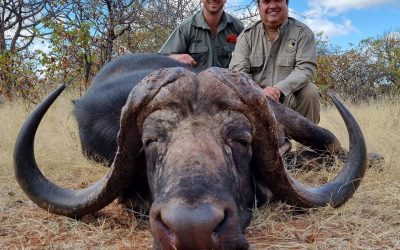So you’ve always dreamt of going on an unforgettable hunting adventure in the vast lands of Africa, but the question on your mind is whether it’s possible to hunt on private land in the continent. Well, the answer is a resounding yes. Africa boasts a plethora of private game reserves and ranches that offer exclusive hunting opportunities for avid hunters like yourself. Whether you’re after the thrill of tracking big game or seeking a unique hunting experience, the pristine landscapes of private African land await to make your safari dreams come true.
Laws and Regulations
Legal requirements for hunting on private land
When it comes to hunting on private land in Africa, there are certain legal requirements that need to be followed. These requirements vary from country to country, so it’s important to research and understand the specific laws of the region you plan to hunt in. In many cases, hunters may need to obtain a hunting license or permit. These licenses are typically issued by the government or local authorities and may involve certain fees and documentation.
Licensing and permit regulations
Obtaining a hunting license or permit is a crucial step in hunting on private land in Africa. These licenses are usually issued for a specific duration, and hunters are required to adhere to the regulations outlined in the license. The process for obtaining a license may involve providing documentation such as proof of identity, residency status, and a clear criminal record. It’s important to note that these regulations may also specify the type of wildlife that can be hunted and the methods that can be used.
Restrictions on hunting certain species
It’s essential to be aware of the restrictions in place regarding hunting certain species on private land in Africa. Many countries have designated protected species and hunting these animals is strictly prohibited. These protected species are often endangered or threatened and are afforded legal protection to ensure their conservation. It is the responsibility of the hunter to familiarize themselves with the list of protected species and to avoid any hunting activities that could contribute to their decline.
Private Land Ownership
Understanding private land ownership in Africa
Private land ownership can vary across different countries in Africa. It’s important to have a solid understanding of the land ownership laws and regulations in the specific region you plan to hunt. In some cases, private land is owned by individuals or corporations, while in others, it may be community-owned or held by tribal authorities. This distinction can impact your hunting experience as it may determine who has the authority to grant permission for hunting and the regulations that must be followed.
Different types of private land
Private land in Africa can be categorized into various types, each with its own set of rules and regulations. It could be agricultural land, game ranches, or conservancies. Agricultural land is primarily used for farming and may have limited hunting opportunities. Game ranches, on the other hand, are specifically managed for wildlife and offer hunting opportunities. Conservancies are areas dedicated to conservation and sustainable land use, often allowing controlled hunting as a management tool. Understanding the different types of private land will help you choose the most suitable location for your hunting adventure.
Landowner rights and permissions
As a hunter on private land, it’s vital to respect the rights and permissions of the landowner. In Africa, landowners have the authority to grant or deny access for hunting on their property. It is important to establish a positive and respectful relationship with the landowner before pursuing any hunting activities. This may involve contacting the landowner directly or through a hunting outfitter or guide. Obtaining written permission and adhering to any specific conditions or restrictions set by the landowner is crucial to maintaining a positive hunting experience.
Choosing a Location
Researching suitable hunting locations
Before embarking on a hunting trip, it’s essential to thoroughly research and identify suitable hunting locations in Africa. This involves considering factors such as the availability of wildlife species, the habitat type, and the overall hunting experience offered by different regions. Online resources, hunting forums, and local hunting associations can provide valuable information and recommendations. It’s important to gather as much information as possible to ensure that the chosen location meets your expectations and aligns with your hunting goals.
Contacting landowners or hunting outfitters
Once you have identified potential hunting locations, contacting the landowners or hunting outfitters becomes a crucial step. These individuals or organizations can provide insights into the hunting opportunities available on their land and advise on the required permits and licenses. They can also guide you through the process of making reservations and help plan your hunting adventure. Building a rapport with the landowners or outfitters not only facilitates the logistics but also ensures a smoother experience during your hunt.
Considerations for different regions and countries
Africa is a diverse continent with a wide range of countries and regions, each offering unique hunting experiences. It’s important to consider the specific factors that vary across different regions and countries. These factors include the availability of specific game species, hunting regulations, cultural practices, and logistical considerations. Some regions may have better infrastructure and access while others may be more remote and challenging to navigate. Understanding these differences will help you choose a location that aligns with your preferences, abilities, and budget.
Costs and Fees
Understanding the financial aspects of hunting on private land
Hunting on private land in Africa involves certain costs and fees that need to be understood and accounted for. These financial aspects can include land access fees, hunting licenses, permits, accommodation, transportation, and equipment rental. It’s essential to have a clear understanding of the overall cost involved in order to plan your budget effectively. Researching and comparing prices, as well as discussing costs with the landowners or outfitters, will give you a better idea of the financial obligations associated with your hunt.
Land access fees and permits
Land access fees are a common financial requirement for hunting on private land in Africa. These fees can vary depending on the location, the duration of the hunt, and the services provided. Land access fees typically cover the privilege of hunting on the property and may contribute to the conservation efforts of the landowner. Additionally, specific permits may be required to hunt certain species, and these permits may come with additional costs. It’s important to obtain information on all applicable fees and permits to ensure compliance and avoid any surprises during your hunt.
Costs of hunting guides or outfitters
Engaging the services of a hunting guide or outfitter can greatly enhance your hunting experience on private land in Africa. These professionals have local knowledge, experience, and expertise that can contribute to a successful and enjoyable hunt. However, it’s important to consider the costs associated with hiring a guide or outfitter. These costs may include daily rates, accommodation, meals, transportation, and trophy fees. Conducting thorough research, reading reviews, and comparing prices will help you find a reputable guide or outfitter that suits your budget and requirements.
Hunting Seasons
Seasonal restrictions and limitations
Hunting seasons play a significant role in managing wildlife populations and ensuring sustainable hunting practices. Different regions and countries in Africa have distinct hunting seasons for specific game species. These seasons are designed to align with the breeding and migration patterns of the wildlife, as well as the natural resource availability. It’s important to be aware of the seasonal restrictions and limitations in the area where you plan to hunt. This information will help you plan your hunting trip accordingly and ensure compliance with the regulations in place.
Peak hunting times for different game species
Understanding the peak hunting times for different game species is beneficial for maximizing your chances of success. These peak times often coincide with specific phases of the animal’s life cycle or seasonal movement patterns. For example, the rutting season for certain antelope species can be a prime time for hunting due to increased activity and vulnerability of the animals. Researching the peak hunting times for your target species will allow you to plan your trip accordingly and increase your opportunities for a successful hunt.
Hunting calendars and availability
Many hunting reserves and outfitters provide hunting calendars that outline the availability of different game species throughout the year. These calendars can be a valuable resource when selecting the dates for your hunting trip. It’s important to consider the availability of your target species, weather conditions, and other logistical factors when determining the most suitable time to go hunting. Consulting hunting calendars and engaging in discussions with local experts or outfitters will help you make an informed decision and optimize your hunting experience.
Game Species
Popular game species to hunt on private land in Africa
Africa is renowned for its diverse range of game species that attract hunters from around the world. When hunting on private land, there are several popular game species that are commonly pursued. These can include animals such as impala, kudu, wildebeest, zebra, eland, buffalo, and various antelope species. These game species offer a challenging and rewarding hunting experience, showcasing the rich biodiversity of the African continent. Researching the availability and hunting regulations for these popular game species will help you choose a location that aligns with your hunting interests.
Endangered or protected species restrictions
As mentioned earlier, it’s crucial to be aware of the restrictions on hunting endangered or protected species in Africa. These restrictions are in place to ensure the conservation and preservation of these vulnerable animals. Species such as rhinoceros, African elephant, lion, leopard, and cheetah are generally protected and hunting them is prohibited. It is essential to familiarize yourself with the list of protected species in the region you plan to hunt and refrain from any hunting activities that could harm these precious creatures.
Exotic or non-native species
In addition to the popular game species native to Africa, some private hunting reserves also offer the opportunity to hunt exotic or non-native species. These species are often introduced to the region for various reasons, such as conservation efforts or enhancing the hunting experience. Examples of exotic species that can be hunted on private land in Africa include species like sable antelope, waterbuck, nyala, and axis deer. It’s important to understand the regulations and considerations specific to hunting these exotic species to ensure compliance with local authorities and conservation practices.
Hunting Methods
Different hunting methods allowed on private land
Private hunting reserves in Africa typically permit a variety of hunting methods, providing options that suit the preferences and abilities of different hunters. Common hunting methods include spot and stalk, hunting from a blind or hide, and tracking. Spot and stalk involves visually locating the game and then moving closer to take a shot. Hunting from a blind or hide requires the hunter to wait in a concealed location for the game to approach. Tracking involves actively following the tracks and signs of the animal. Understanding the hunting methods allowed and their suitability for your hunting style will contribute to a successful and enjoyable hunt.
Firearms restrictions and regulations
Firearms regulations vary across different countries and regions in Africa, and it’s important to understand and comply with the specific regulations of the area you plan to hunt. Hunters are typically required to possess the appropriate firearms licenses and adhere to the caliber and ammunition restrictions outlined by the local authorities. It’s crucial to research and familiarize yourself with the firearms regulations, transportation requirements, and any necessary permits or documentation needed to hunt with firearms on private land in Africa.
Bowhunting or crossbow options
For those interested in a more challenging and intimate hunting experience, bowhunting or crossbow hunting may be an appealing option. While firearms are commonly used for hunting on private land in Africa, certain reserves and outfitters also allow bowhunting. Bowhunting requires a higher level of skill, as the effective range is generally shorter compared to firearms. It’s important to ensure that the hunting location permits bowhunting and to have the necessary skills, equipment, and permits for this method of hunting. Crossbow hunting is another alternative that provides increased accuracy and range compared to traditional bows.
Conservation and Sustainability
Importance of responsible hunting practices
Responsible hunting practices are essential for the conservation and sustainability of wildlife populations in Africa. By practicing ethical and sustainable hunting, hunters contribute to the balance and long-term survival of game species. Responsible hunting involves targeting specific animals that are part of a management plan, leaving breeding stock intact, and avoiding overhunting or trophy hunting. It’s important to ensure that your hunting activities align with these principles and promote the well-being and conservation of the wildlife and their habitats.
Conservation efforts on private hunting reserves
Private hunting reserves in Africa often play a significant role in conservation efforts. These reserves actively manage and protect their wildlife populations, including threatened and endangered species. Through regulated hunting, habitat preservation, anti-poaching measures, and community involvement, these reserves contribute to the sustainability of the ecosystems and wildlife. Supporting private hunting reserves that prioritize conservation initiatives allows hunters to actively participate in the preservation of Africa’s natural heritage.
Sustainable game management
Sustainable game management is crucial for maintaining healthy and balanced wildlife populations. Private landowners and hunting outfitters often collaborate with wildlife experts and conservation organizations to implement sustainable game management practices. These practices include monitoring animal numbers, habitat management, and implementing selective hunting strategies. By adhering to sustainable game management principles, hunters can ensure that their hunting activities have a positive impact on the ecosystem and contribute to the long-term resilience of the wildlife populations.
Safety Precautions
Ensuring your safety and the safety of others
Safety should be a top priority when hunting on private land in Africa. It is essential to follow all safety guidelines and procedures to minimize the risk of accidents or injuries. This includes practicing proper firearm safety, always treating firearms as if they are loaded, and adhering to trigger discipline. Additionally, being aware of your surroundings, using appropriate safety gear such as blaze orange clothing, and communicating effectively with hunting partners are all crucial aspects of ensuring a safe hunting experience.
Firearms safety and training
Proper firearms safety and training are paramount when engaging in hunting activities. It is essential to be familiar with your firearm, its operation, and safe handling practices. Ensuring that you have received adequate firearms training and practice regularly will contribute to a safer and more effective hunting experience. It’s also advisable to keep your firearms secured and locked when not in use, and to transport them in accordance with local regulations and guidelines.
Risks and precautions in the African wilderness
Hunting in the African wilderness can present unique challenges and risks. It’s important to be aware of the potential dangers associated with the environment, such as wildlife encounters, extreme weather conditions, and rugged terrain. Understanding the risks and taking necessary precautions, such as carrying appropriate first aid kits, emergency communication devices, and being accompanied by experienced guides or outfitters, will help mitigate these risks. It’s advisable to conduct thorough research, heed local advice, and practice common sense when venturing into the African wilderness for hunting.
Ethical Considerations
Understanding the ethics of hunting on private land
Ethics play a significant role in hunting on private land in Africa. It’s essential to have a clear understanding of the ethical considerations associated with hunting and to ensure that your hunting activities align with these principles. Ethical hunters prioritize fair chase, respect for the animal and its welfare, and responsible resource utilization. By adhering to ethical principles, hunters can contribute to the conservation of wildlife populations, respect local customs and traditions, and maintain a positive image of hunting as a sustainable and responsible pursuit.
Respecting local customs and traditions
Hunting on private land in Africa often involves interacting with local communities and indigenous people who have deep-rooted customs and traditions. It’s important to respect and appreciate these cultural practices, as they play an integral part in the conservation of wildlife and ecosystems. Learning about the local customs, engaging with the communities in a respectful manner, and being receptive to their perspectives will contribute to a more authentic and meaningful hunting experience.
Balancing conservation and hunting interests
Balancing conservation efforts and hunting interests is a delicate and ongoing process. Private landowners, outfitters, and hunters all have a role to play in maintaining this balance. By actively supporting conservation initiatives, respecting hunting regulations, and engaging in sustainable hunting practices, hunters can demonstrate their commitment to the long-term conservation of Africa’s wildlife and habitats. Recognizing the integral relationship between conservation and hunting interests will foster a harmonious and mutually beneficial coexistence between hunters and the environment they cherish.










